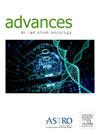结合放射敏感性指数和放射耐药相关指数可改善前列腺癌预后预测
IF 2.2
Q3 ONCOLOGY
引用次数: 0
摘要
目的建立31基因特征(31-GS)、放射敏感性指数(RSI)和放射耐药相关基因指数(RRRI)相结合的nomogram预测前列腺癌(PCa)患者的复发。方法与材料从基因表达图谱和癌症基因组图谱中获取PCa的转录组数据,验证31-GS、RSI和RRRI 3组已发表的生物标志物的预测潜力。为了根据PCa的特征调整这些标记,我们通过Cox分析、最小绝对收缩和选择算子回归分析,分析了基于31-GS、RSI和RRRI的4个PCa相关放射敏感性预测指标。采用随时间变化的受者工作特征曲线、决策曲线分析、综合判别改进、净重分类改进和决策树模型构建来比较这4个基因特征对放射敏感性的预测能力。通过加权基因共表达网络分析和基因功能富集分析,确定了关键模块和相关功能。为了提高递归预测能力,建立了一种模态图。结果验证并比较了2个已发表的预测指标的预测潜力。基于31-GS、RSI和RRRI,我们分析了4个与pca相关的放射敏感性预测指标:14Genes、RSI、RRRI和20Genes。其中,14个基因表现出最有希望的预测性能和判别能力。14Genes模型定义的关键模块中的基因在放射治疗相关的细胞死亡途径中显著富集。在癌症基因组图谱和基因表达综合系列(GSE)队列中,14个基因的接受者工作特征曲线和决策树变量重要性下的面积最高。结论本研究成功建立了放射敏感性相关nomogram放射敏感性相关nomogram放射敏感性相关nomogram放射敏感性相关nomogram放射敏感性相关nomogram放射敏感性相关nomogram放射敏感性相关nomogram放射敏感性相关nomogram放射敏感性相关nomogram放射敏感性相关nomogram放射敏感性相关nomogram放射敏感性相关nomogram对于接受放射治疗的患者,20Genes和RRRI模型可用于预测无复发生存期,而20Genes更具有放射治疗特异性,但需要进一步的外部验证。本文章由计算机程序翻译,如有差异,请以英文原文为准。
Integrating Radiosensitivity Index and Radiation Resistance Related Index Improves Prostate Cancer Outcome Prediction
Purpose
This study aimed to establish a nomogram combining 31-gene signature (31-GS), radiosensitivity index (RSI), and radiation-resistance-related gene index (RRRI) to predict recurrence in prostate cancer (PCa) patients.
Methods and Materials
Transcriptome data of PCa were obtained from gene expression omnibus and the cancer genome atlas to validate the predictive potential of 3 sets of published biomarkers, namely, 31-GS, RSI, and RRRI. To adjust these markers for the characteristics of PCa, we analyzed 4 PCa-associated radiosensitivity predictive indices based on 31-GS, RSI, and RRRI by the Cox analysis and least absolute shrinkage and selection operator regression analysis. Time-dependent receiver operating characteristic curves, decision curve analyses, integrated discrimination improvement, net reclassification improvement and decision tree model construction were used to compare the radiosensitivity predictive ability of these 4 gene signatures. Key modules and associated functions were identified through a weighted gene co-expression network analysis and gene function enrichment analysis. A nomogram was built to improve the recurrence-prediction capability.
Results
We validated and compared the predictive potential of 2 published predictive indices. Based on the 31-GS, RSI, and RRRI, we analyzed 4 PCa-associated radiosensitivity predictive indices: 14Genes, RSI, RRRI, and 20Genes. Among them, 14Genes showed the most promising predictive performance and discriminative capacity. Genes in the key module defined by the 14Genes model were significantly enriched in radiation therapy-related cell death pathways. The area under receiver operating characteristic curve and decision tree variable importance for 14Genes was the highest in the cancer genome atlas and Gene Expression Omnibus Series (GSE) cohorts.
Conclusions
This study successfully established a radiosensitivity-related nomogram, which had excellent performance in predicting recurrence in patients with PCa. For patients who received radiation therapy, the 20Genes and RRRI models can be used to predict recurrence-free survival, whereas 20Genes is more radiation therapy-specific but needs further external validation.
求助全文
通过发布文献求助,成功后即可免费获取论文全文。
去求助
来源期刊

Advances in Radiation Oncology
Medicine-Radiology, Nuclear Medicine and Imaging
CiteScore
4.60
自引率
4.30%
发文量
208
审稿时长
98 days
期刊介绍:
The purpose of Advances is to provide information for clinicians who use radiation therapy by publishing: Clinical trial reports and reanalyses. Basic science original reports. Manuscripts examining health services research, comparative and cost effectiveness research, and systematic reviews. Case reports documenting unusual problems and solutions. High quality multi and single institutional series, as well as other novel retrospective hypothesis generating series. Timely critical reviews on important topics in radiation oncology, such as side effects. Articles reporting the natural history of disease and patterns of failure, particularly as they relate to treatment volume delineation. Articles on safety and quality in radiation therapy. Essays on clinical experience. Articles on practice transformation in radiation oncology, in particular: Aspects of health policy that may impact the future practice of radiation oncology. How information technology, such as data analytics and systems innovations, will change radiation oncology practice. Articles on imaging as they relate to radiation therapy treatment.
 求助内容:
求助内容: 应助结果提醒方式:
应助结果提醒方式:


